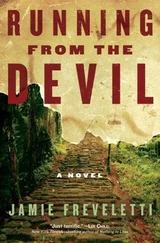I once saw red ants swarming over one of the big black ants; it staggered like a bull brought down by a pack of wild dogs, helpless as the red ants began to eat it alive. When it stopped struggling they carried it away, still twitching, even though it was several times bigger than each of them. Much later I learned that the only two species who wage war against their own kind are ants and men.
Pa Roke watched me for a short while and then he beckoned to me to follow him. We went a little way to the edge of the compound where the earth was soft and sandy. There were several funnel-shaped holes, each barely an inch across. Pa Roke waved, indicating to me to crouch down and watch. He picked up a dried leaf and broke off a fraction of the tip and dropped it over the rim of the tiny crater.
‘What is it?’ I asked. Pa Roke put his finger to his lips.
For a few seconds nothing happened. We waited. I began to think there was something wrong with Pa Roke. But when I glanced up at him to check, he pointed impatiently back at the ground. I looked back and the piece of leaf was gone. A second later it came flying out of the hole and landed on the ground by my feet. I started. Pa Roke laughed, a short hoarse sound. He looked genuinely amused.
A small, black ant wandered by. Pa Roke used the edge of the leaf still in his hand to ease it over the edge of the hole. As the ant slid down the sandy incline, it began to scrabble desperately, raking the smooth sides as it failed to find a grip. When it reached the bottom it waved its antennae around, apparently trying to get its bearings. I knew now what was going to happen. There was a tiny flurry. The ant reared up and then disappeared beneath the sand, its angular legs the last to go under.
‘Ant lion,’ said Pa Roke. And he got up and nimbly stepped back up to the house, his robes flapping behind him like a great bird.
I fetched a stick and poked around the sand in the hole. I wanted to save the ant. I unearthed an insect the shape of a miniature armadillo; it was still holding on to the ant, which had accepted its fate and stopped kicking. But freed from the earth the ant seemed to fight with renewed vigour. The ant lion gave up, retreating back under the sand while the ant hobbled away: a crumpled body on broken legs.
In Mamunta, Pa Santigi, brother to Ya Beyas, decided to run for the forthcoming chieftaincy elections. The chieftaincy rotated between the three ruling families and the last ruler had died some months before. Now the elders were busy organising elections for a new king, though since the arrival of the British there were officially no more kings, only paramount chiefs. When the protectorate was brought under British colonial rule the newly installed governor declared the only recognised sovereign from that day on was Victoria, Queen of England.
Ya Beyas’s son Saidu helped in the elections, canvassing votes for his uncle among the people of the outlying villages. Now a grown man with two wives, he had moved away from Mamunta and farmed at a small settlement called Rogbonko. He spent many days and weeks on the campaign trail, sometimes taking his two children to accompany him.
Nearing the crucial run-up to the election, Pa Santigi’s campaign began to run out of funds. The uncles needed to raise cash in the fastest way possible and they decided to sell their nephew Saidu into bondage to a wealthy farmer in Mayoso. There he worked long days and slept in the fields at night alongside other indentured men and prayed that his uncle would win the election and redeem him as soon as possible.
A year later Saidu found himself living in the forest, taking part in the kantha of his uncle, now Chief Masamunta Kanakoton of Kholifa Mamunta. Though still young his political skills and commitment were evident and Saidu was to be honoured with the title Pa Mas’m, chief minister and principal adviser to the new king. For months the king and his ministers stayed hidden beyond the darkness of the trees in the sacred bush, where they learned the principles of governance from the elders and took part in induction rituals carried out by the secret society, the Poro.
At the end of this came the three-day kathora , the ceremony to install the new ruler. On Chief Masamunta’s head sat the stiff, embroidered head-dress; on his chest lay a heavy necklace of amulets and animals’ teeth and he carried a long, forked staff covered with leather and adorned with fragments of leopard skin. He led his cabinet forward into the village to the barrie and they circled it thrice before they entered and took up their places.
Weeks later the new Pa Mas’m returned to Rogbonko only to find that in his absence his two wives had quarrelled badly. Ya Monday G’bai, a mature widow inherited by Saidu from an uncle on his passing, had departed. According to custom she left her son, also the message that she had gone back to live in peace with her own family. Now Yima, Saidu’s spirited and mischievous younger wife, claimed for herself the role of first wife to the Pa Mas’m.
It was Ya Yima who, passing through Rothomgbai one day on her way back from Mamunta (where her husband now kept a second home in order to attend to his court duties), noticed a girl standing by the side of the path carrying a water jug. There were four miles more to Rogbonko and Ya Yima asked the child for a drink. As she watched the girl quickly pour the water she was impressed by the girl’s demure manner. Yima made enquiries. She found out the child’s name was Ndora; she was the daughter of Yamba Soko Serry and Digba Kamara and the great-granddaughter of a chief.
It was at Ya Yima’s instigation that Ndora became Saidu’s sixth wife and went to live in Rogbonko. Ya Yima herself made all the arrangements. For the first few years Ndora helped the older wives around the house. She fetched water for her husband in the mornings. Late in the day she joined the other young girls down by the stream in the deep channel that ran behind the clay brick houses; they scrubbed clothes, pounding them against the rocks, creating a froth of suds, while cascades of water drops made rainbows above their heads, flashing the same vibrant colours of the kingfishers on the opposite bank.
Some time after her first blood showed, Ndora went to her husband’s room. On the first occasion she was carried, according to custom, on the back of one of the senior wives. From then on she spent three nights with Saidu in turn with each of her co-wives. Ndora’s first son she named Morlai and suckled him for two years. The second child, another son called Mohamed, was born after the harvest in the month of tarokans , a year after Morlai began to eat his first mouthfuls of pap.
Ya Yima was entranced by Ndora’s fat, bright new son. After Mohamed was weaned she insisted on taking over care of the baby herself and, ignoring Ndora’s protests, she brought the child into the big house she shared with Saidu. Ndora was left outside. Yima passed her time playing with the little boy, while Ndora worked long days in the fields side by side with the other junior wives and the indentured men. Sometimes on her way home, she would go by and take little treats to her son: a catapult she made herself or a little piece of canya made of rice flour, sugar and peanuts.
Months passed and still Ya Yima kept little Mohamed by her side. She brushed aside all Ndora’s entreaties. Didn’t she take good care of him? Besides Ndora was so busy. And the little boy was happy, said Ya Yima.
When all else failed Ndora determined to bypass her senior wife’s authority and beg her husband in order to have her child returned to her. Saidu, by now, was used to Ya Yima’s wilfulness. It came as no surprise she had upset a co-wife; nevertheless he did not expect to have to intervene in their concerns. He told Ndora he would handle the matter himself, to be patient and not to worry. But when Ya Yima refused to listen to even his efforts to persuade her, he lost his temper and ordered her to return the boy to Ndora.
Читать дальше












